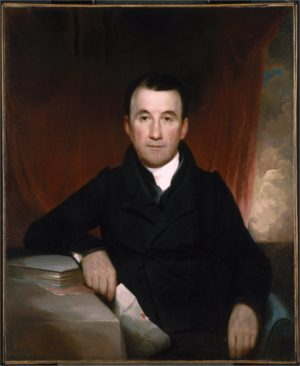1776-1834
Associate Justice of the New York Supreme Court of Judicature, 1814-1823
Jonas Platt was born on June 30, 1776 at Wappinger’s Creek, near Poughkeepsie, New York. His father was a member of the Continental Congress, the Committee of Safety, the Provincial Congress of New York and later, State Senator and first Judge of Dutchess County.
After finishing his education at a French academy in Montreal, Canada, Platt studied law in the office of Colonel Richard Varick in New York City. He was admitted to the bar on July 27th, 1790, and immediately moved to Whitesboro, near Utica, New York. He was appointed Clerk of Herkimer County on February 17, 1791 and when Oneida County was established in 1798, he was appointed the first Clerk of that county. He was a Captain in the Oneida County Militia and later Brigadier General of the 2nd Cavalry Brigade.
Elected to the New York State Assembly in 1796, Jonas Platt also served in the Sixth Congress (March 4, 1799-March 3, 1801) where he was chairman of the Committee on Revisal and Unfinished Business. Between 1809 and 1813, he was a member of the New York State Senate and actively promoted legislation for the construction of the Erie Canal. James Renwick, biographer of De Witt Clinton, says of Judge Platt, “he was well entitled to the merit of having made the first efficacious step towards the attainment of the great object of uniting the lakes with the Atlantic.”
In 1810, Platt ran for Governor of New York but was defeated by his opponent, Daniel D. Tompkins. On February 23, 1814, he was appointed an Associate Justice of the New York Supreme Court of Judicature where he served for a time with Justices James Kent and Ambrose Spencer. In 1820, when Chancellor Kent’s decision in Gibbons v. Ogden was appealed to the New York Court for the Correction of Errors, Justice Platt wrote the decision of that court, affirming Kent’s decision. Knowing that the case would likely come before the Supreme Court of the United States, he addressed the issues in great detail. As expected, the case was appealed to the United States Supreme Court and became the landmark decision in which that Court interpreted the Commerce Clause of the U.S. Constitution for the first time.
Jonas Platt was a member of the Constitutional Convention of 1821 and under the provisions of the new Constitution, his tenure on the Supreme Court ended on January 29, 1823. Platt then opened a law office with his oldest son, Zephaniah, in Utica, New York and, a few years later, moved the practice to New York City, where it flourished.
Judge Platt’s health deteriorated in 1830 and he retired to his farm on the shores of Lake Champlain, seven miles from Plattsburg, the city founded by his father. He died there on February 22, 1834.
Sources
11 Am. Jurist & L. Mag. 488 (1834).
Thomas P. Campbell, Jr. Chancellor Kent, Chief Justice Marshall and the Steamboat Cases. 25 Syracuse L. Rev. 497 (1974).
Proceedings of the New York State Historical Association, vol. 14. http://www.brooklynmuseum.org/community/blogosphere/2009/01/29/jonas-platt

